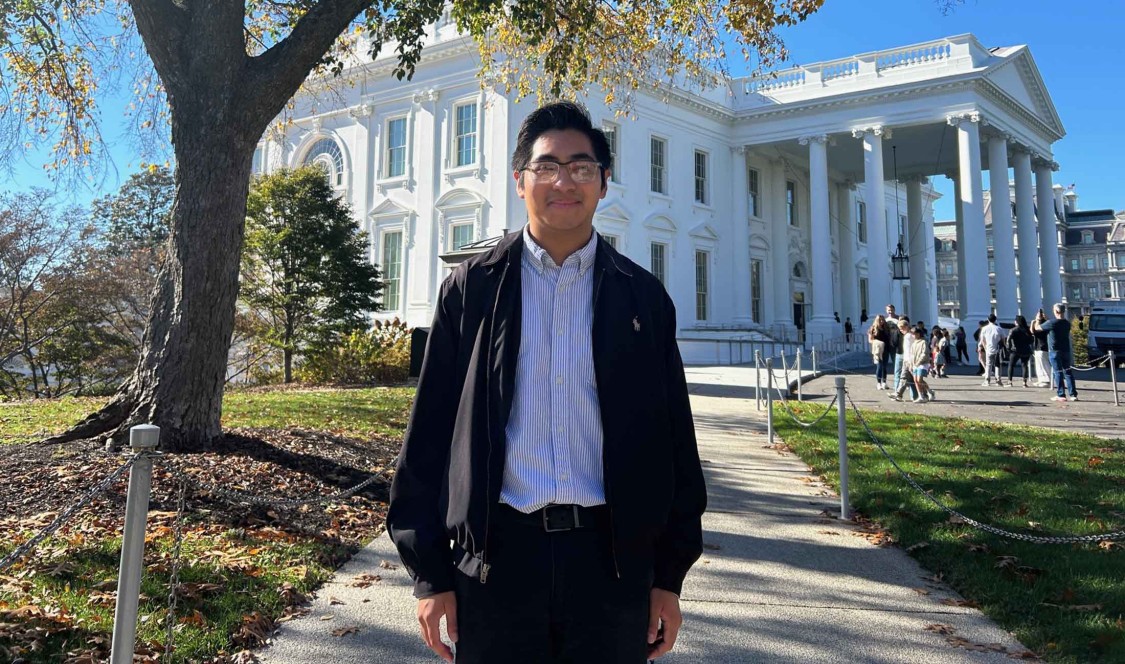Daniel Penaloza ’26 was drawn to Claremont McKenna College for its “liberal arts nature and emphasis on interdisciplinary learning.”
At CMC, the Public Policy and Biology dual major has taken advantage of real-world opportunities offered by CMC’s Washington Program and as a 2023 Eastern Sierra Research Station Summer Fellow with the Roberts Environmental Center.
A QuestBridge scholar who hails from Moorpark, Calif., Penaloza describes the CMC community as “close-knit,” where each student is “driven to excel both inside and outside the classroom.” Entering his senior year, Penaloza is most excited to complete his thesis, document findings from a summer of research engineering bioluminescent probes, and lead the 5C Students for Farmworkers support group, a club he has been active with since his first year.
What has been the highlight of your time at CMC so far?
Participating in the Washington Program. I especially enjoyed being surrounded by peers who were taking classes and working full-time; sharing similar stressors and goals for the semester reminded me of the CMC community I’ve come to appreciate in Claremont.
My time away from campus occurred during a pivotal time in American politics, the 2024 presidential election, and my experience was greatly enriched because of it. Visiting historical monuments and attending rallies brought together the history of this country that I received from classes in a meaningful way. It was one thing to write about democracy in an essay, and it was an entirely different thing to witness it in action. My time in D.C. pushed me to reflect on my own views—how I interpret political responsibility and the role I want to play in the communities I identify with. It felt like both a culmination of my growth at CMC and a launchpad for what comes next.
As an intern with the Department of Justice’s Consumer Protection Branch, I supported the work of multiple attorneys working on civil and criminal cases involving fraud and regulatory noncompliance. Much of my time was spent working with an attorney specializing in transnational Spanish-language fraud. My bilingual skills allowed me the unique opportunity to help progress on a case by translating letters of correspondence between suspected fraudsters.
What does responsible leadership and constructive dialogue at CMC mean to you? How have you experienced those values directly as a student?
It means recognizing that meaningful change starts with hearing from a diversity of opinions and interests other than our own, and to do so in good faith. I came to CMC wanting to study politics and policy to create change in my community, but I quickly learned that leadership isn’t just about passing laws or holding titles; it’s about uniting people with different motivations under a shared purpose.
Through my coursework, I’ve come to understand that social progress often precedes legal change and that moral and intellectual integrity demand we make honest attempts at understanding the motivations and interests of people with whom we share few commonalities. I’ve attempted to integrate these lessons into my role with the 5C Students for Farmworkers Support Group. While the students involved may stay for various reasons, because the work touches on issues of human rights, environmental justice, or immigration advocacy, we all ultimately work towards common goals and objectives. Authentic, transformational leadership is about building coalitions, not just holding a particular title.
What are your goals after CMC?
Currently, I plan to pursue a Ph.D. in the biological sciences with an emphasis on immunology and public health. Over the past few years, I’ve worked to strengthen my research skills through projects ranging from sustainable nanoparticle synthesis to improve agricultural fertilizers, to my current work with Kravis Department of Integrated Sciences Professor Colin Rathbun on protein engineering and the molecular mechanisms of disease. I hope to apply these skills to advance evidence-based public health solutions within the federal government. I believe lasting, systemic change is best achieved through institutions that serve the public interest—and that their success depends on the integration of rigorous, research-driven insights.

